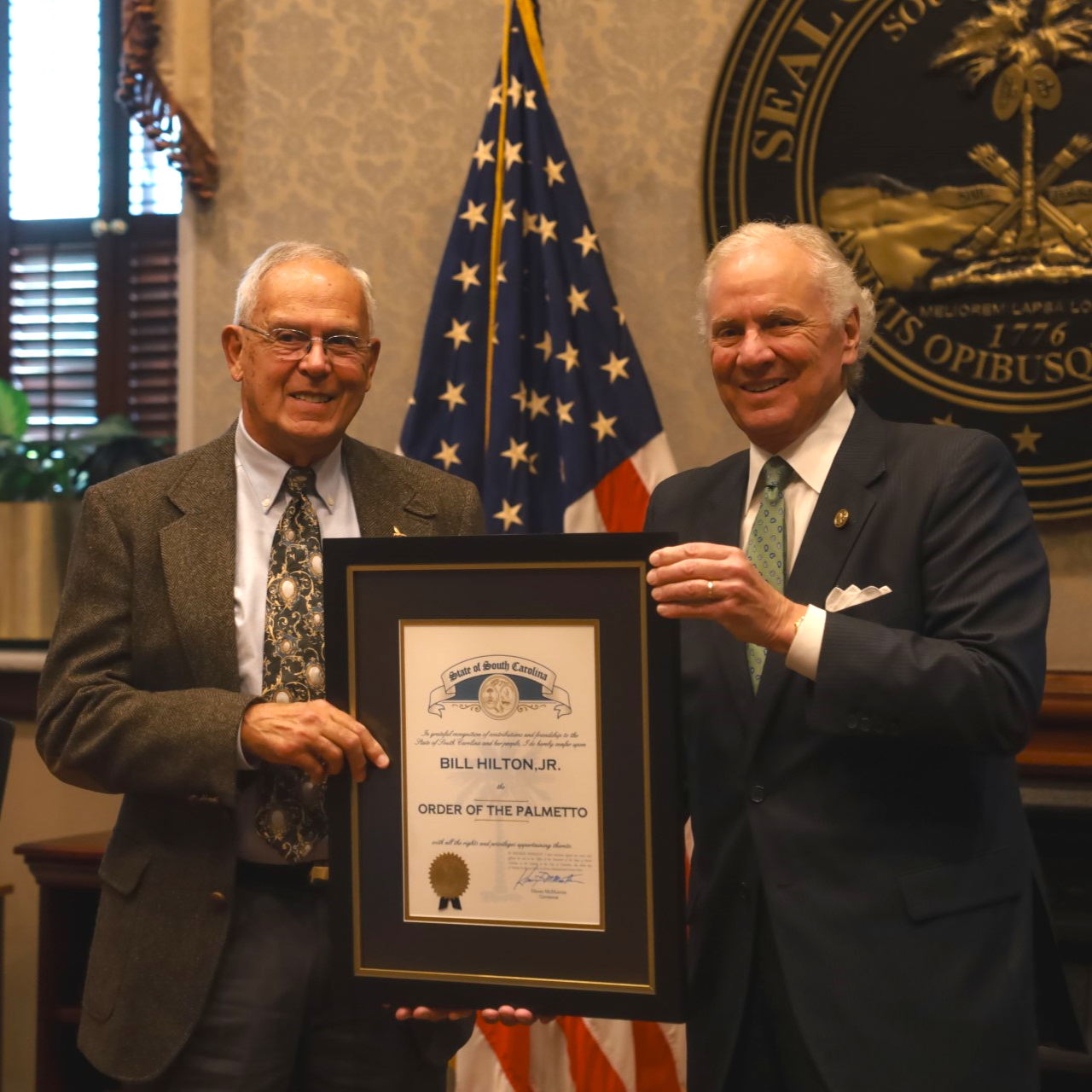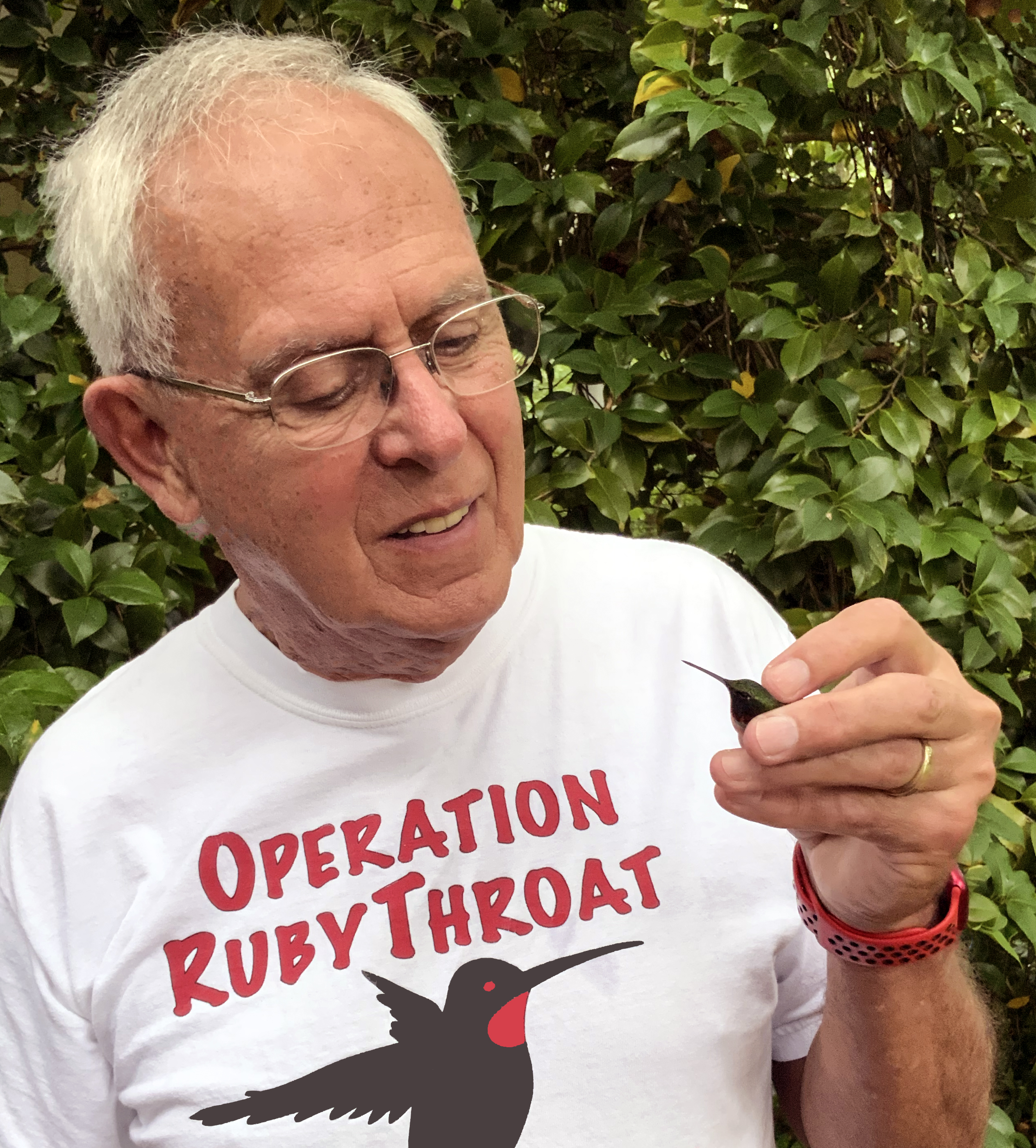Bill Hilton Jr. ’70 awarded Order of the Palmetto
by Jay Salter '19 | External Communications Coordinator - November 6, 2023
by Jay Salter '19 | External Communications Coordinator - November 6, 2023

COLUMBIA, S.C. — Bill Hilton Jr. '70 has received South Carolina’s highest civilian honor for his contributions to science, nature and education. Gov. Henry McMaster awarded him with the Order of the Palmetto to recognize his life’s work, which includes bird banding, teaching, preservation, and serving his alma mater.
Bird banding involves catching and tagging birds to better study and identify them, as well as to monitor the health of bird populations. Hilton began banding birds in South Carolina in 1982, the same year he established Hilton Pond Center for Piedmont Natural History near his home in York. As of press time, Hilton has banded 78,814 birds of 127 species in his 41 years of practice.
“That's a lot of birds,” said Hilton. “A lot of those I banded and never saw again, either they were in migration, or they just dispersed or whatever. But a lot of them have been resident birds or have come back after migrating away. They've been adding to the understanding of the behavioral ecology of birds in the Carolinas.
“Since very little banding is done in the Carolina Piedmont, the work I'm doing here has potential for significant information that we wouldn’t have otherwise,” he added.
Hilton said bird banders catch birds using a variety of live traps and nets, affix a numbered band, issued by the Bird Banding Laboratory, to one of the birds’ legs, take a variety of measurements, and then release them. The identification allows other banders to record their findings in the national bird banding database, which compiles information on movements, longevity, site fidelity and more.
“I think the furthest bird I've had was in Newfoundland, and that's pretty far to go,” said Hilton. “Not all of them are long-distance, but quite a few of them are.”
 While he has documented many species, his specialty is the ruby-throated hummingbird (one of which he is holding at right). The species can be found in the Carolinas during the spring, summer and fall, but they migrate south for the winter. Hilton is one of a select few who have studied them on the other end of their migration to Central America.
While he has documented many species, his specialty is the ruby-throated hummingbird (one of which he is holding at right). The species can be found in the Carolinas during the spring, summer and fall, but they migrate south for the winter. Hilton is one of a select few who have studied them on the other end of their migration to Central America.
“I’ve taken 30 different groups of citizen-scientists to the Neotropics — Costa Rica, Nicaragua, Belize — and we made a lot of discoveries down there that were unknown about ruby-throats on their wintering grounds,” he said.
After graduating from Newberry College with a degree in philosophy, Hilton earned a master’s in teaching biology from Winthrop University. He then traveled to Minnesota, where he banded and studied Blue Jays while earning his master’s in ecology and behavioral biology from the University of Minnesota. After returning to the Palmetto State, he taught high school biology and established his namesake nature center, the only year-round, long-term banding site in the Carolinas.
In addition to pioneering ornithology in South Carolina, Hilton’s other accomplishments include helping to establish the Governor's School for Science & Mathematics with his wife, Susan Ballard Hilton '71; as well as working with the Daniel Stowe Botanical Garden, the Allison Woods Foundation, and RibbonWalk, Charlotte’s Botanical Forest.
At Newberry College, Hilton chaired the John Bachman Symposium of 2006 and served as president of the Alumni Association, which included a stint on the Newberry College Board of Trustees, from 2004-06. For his achievements and service, Hilton has been honored with a charter membership in the Hall of Master Teachers (2012), an honorary Doctor of Science degree (2013), and the Alumni Distinguished Service Award (2021), among many others.
Hilton was nominated for the Order of the Palmetto by his state senator, Mike Fanning, who surprised him with the news on his 77th birthday.
Hilton refuses to use the word, “retired.” A lifelong educator, Hilton encourages everyone to do their research about what they can do to help birds, prevent further habitat loss, and enjoy nature.
“Birds are a really good indicator of the health of the environment, and there are a lot of indications that our environment is not all that healthy,” he said. “I encourage people to do away with manicured lawns and put in native plants, put out a bird feeder and maintain it properly, and watch what happens.
“People don’t have to go to foreign countries or across the U.S. to see nature. The best place to watch nature, in my mind, is in your own backyard. Get familiar with what you have and what you can do to provide habitat right out your back door,” he said.
To watch CN2 News' special report (1:50), click here.
To learn more about Hilton’s ongoing research, visit hiltonpond.org.